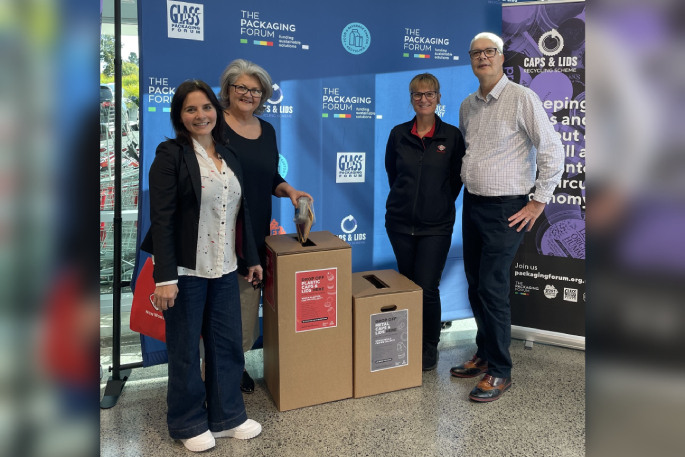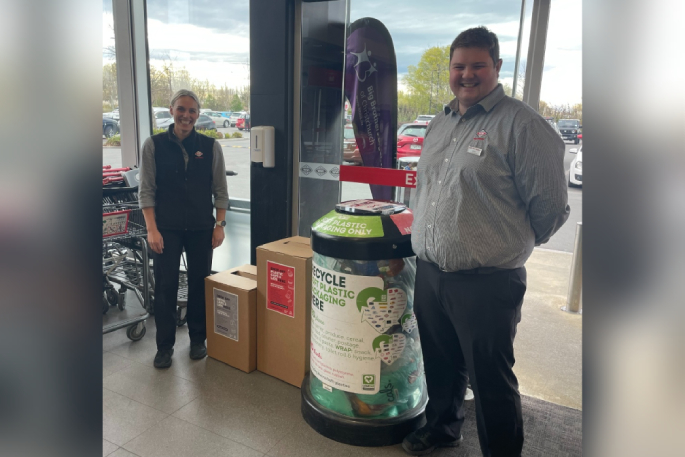Foodstuffs is proud to be the foundation partner for The Packaging Forum’s newly launched Caps and Lids Recycling Scheme, with Kiwis able to recycle their caps and lids at 16 PAK’nSAVE, New World and Four Square stores in Auckland, Tauranga, and Christchurch.
Foodstuffs will be working with the Packaging Forum to help grow and expand the collection network over the next 12 months.
This will be good news to many, following the changes to New Zealand’s kerbside recycling earlier this year that meant caps and lids for many everyday household items, like plastic ice cream lids and jam jar lids, were no longer accepted in kerbside recycling bins.
An estimated 60 per cent of all packaging includes a cap or lid and around 16,000 tonnes of plastic and metal lids are used to close and seal products every year in New Zealand.
“Since the Government announced changes to kerbside recycling, we’ve been working closely with The Packaging Forum and other member organisations to find a solution to help Kiwis recycle their caps and lids,” said Foodstuffs Sustainable Packaging Manager Debra Goulding.
“Kerbside standardisation is necessary to simplify and streamline the collection of materials for recycling but we need to do more to prevent sending this valuable material to landfill.
“As a 100 per cent New Zealand-owned and operated co-operative of local grocers, we’re committed to making our packaging more recyclable, reusable or home composable and we don’t want these items ending up in our waterways or landfills.”
 FSNI Caps and Lids Recycling. Photo: Supplied.
FSNI Caps and Lids Recycling. Photo: Supplied.
Foodstuffs, alongside several other organisations like Lion, NZ Post, Fonterra, Frucor Suntory, Coca-Cola, PepsiCo, Nestle and L’Oreal, signed the New Zealand Plastic Packaging Declaration in 2018, committing to make all their packaging reusable, recyclable or compostable by 2025.
“The Government’s change to kerbside recycling and packaging types has impacted our ability to meet those targets, so supporting and helping to grow the Caps and Lids Recycling Scheme is one way we’re working towards our sustainable packaging commitment,” Goulding said.
"A group of Packaging Forum member organisations and brands owners have invested in establishing the network so that these items can be collected, stored and recycled.”
Special collection bins will be installed at participating stores to accept a wide range of plastic and metal caps and lids. This includes beer and wine bottle caps, as well as caps and lids from spreads, cleaning and cosmetic products and hinged-style caps such as those found on sauce bottles.
The processing partners for the scheme are PACT Recycling in Auckland for the plastic items and Hayes Metals, Simms Metals and the Association of Metal Recyclers for all the metal caps and lids.
Rob Langford, CEO of The Packaging Forum, which also runs the successful Soft Plastic Recycling Scheme, said he hopes Kiwis get behind recycling their caps and lids because the goal is to demonstrate demand for a specialist recycling facility to be built here in New Zealand.
“Having the infrastructure to collect the caps and lids, the ability to sort them and then build up the volume of recyclable materials is absolutely key in working towards establishing the full end-to-end infrastructure here in New Zealand,” Langford said.
“We came across the same hurdle when we launched soft plastics recycling in 2016 and even for kerbside recycling, a portion of items need to go to Australia to be recycled” he said.
The Scheme drop off points will initially be available in selected PAK’SAVE, New World and Four Square stores in Auckland, Christchurch and Tauranga with a plan to roll it out through other retail partners, community networks and recycling hubs. Langford said Kiwis located in a region that currently does not have collection boxes are encouraged to collect their caps and lids in anticipation of a collection box arriving in their region.
“If you can, please don’t send these items to landfill. Put them in a bucket or hold on to them and give the scheme a chance to expand to your area. Our hope is that Kiwis get on board with the programme and that we’re able to grow the network and reach as many regions as possible.”
To find a list of collection locations and learn what items can and can’t be recycled, visit https://capslids.recycling.kiwi.nz
Here’s the list of Foodstuffs stores accepting used caps and lids:
Auckland: New World Birkenhead, New World Albany, New World Waiuku, New World Hobsonville, New World Stonefields, PAK’nSAVE Royal Oak, PAK’nSAVE Mt Albert and Four Square Mangawhai Heads
Tauranga: New World Mt Maunganui, New World Gate Pa, New World Brookfield and PAK’nSAVE Tauriko
Christchurch: New World Prestons, New World Bishopdale , New World Wigram and New World Ilam.



2 comments
Hmmmm
Posted on 11-09-2024 09:26 | By Yadick
First I knew about not putting icecream and yogurt lids into recycling. I thought it was only little lids up to milk bottle size lids.
So now we put our rubbish, food scraps and some recycling but not all recycling at the gate including bottles and jars but not all bottles and jars, put our garden waste at the gate but not all garden waste. Bigger or excess rubbish we take at extra expense to the Mount. Lids etc we take with us to the supermarket but not coffee cup lids with the recycling symbol and not necessarily the supermarket we use. This, I must say, is becoming ridiculous, confusing, expensive, and very time consuming.
Humour
Posted on 11-09-2024 09:49 | By Yadick
Saw this bit of humour and it's SO true.
I go to the grocery store and buy 500g of sliced ham in a plastic bag, a loaf of bread in a plastic bag, a litre of milk in a plastic jug, a pack of napkins in plastic wrap, a store-salad in a plastic tub, a plastic bottle of mustard, and a plastic bottle of sauce, meat wrapped in plastic and biscuits in a plastic wrapper . . . but they won't give me a plastic bag to carry it home, because the plastic bag is bad for the environment?
Leave a Comment
You must be logged in to make a comment.